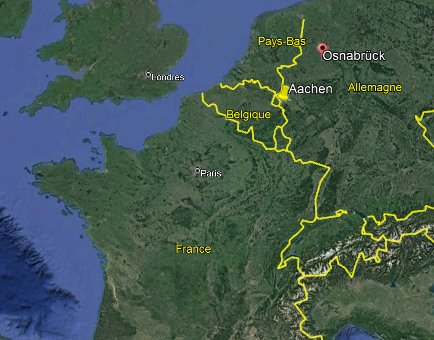ACUFO-1942-05-17-OSNABRUCK-1
In his 2009 catalog of “Foo Fighters” reported by Allied pilots during World War II, French ufologist Dominique Weinstein noted a case in Germany in which an R.A.F. bomber crew flying at 15,000 feet near the town of Osnabrück had observed a rocket with a long white luminous tail at the same altitude as their plane.
He adds that three other crews reported the same thing, and that no explosion bursts were seen.
He indicates that the source is the Intelligence Summary Report No. 166 by the R.A.F. Coastal Command, dated August 30 to September 6, 1942, and the 2007 book “Strange Company,” by Keith Chester.
| Date: | August 17, 1942 |
|---|---|
| Time: | ? |
| Duration: | ? |
| First known report date: | August 30, 1942 |
| Reporting delay: | Hours, 13 days. |
| Country: | Germany |
|---|---|
| State/Department: | Lower Saxony |
| City or place: | Osnabrück |
| Number of alleged witnesses: | Several. |
|---|---|
| Number of known witnesses: | ? |
| Number of named witnesses: | 0 |
| Reporting channel: | R.A.F. Coastal Command report. |
|---|---|
| Visibility conditions: | ? |
| UFO observed: | Yes. |
| UFO arrival observed: | ? |
| UFO departure observed: | ? |
| UFO action: | Flies level with the planes. |
| Witnesses action: | ? |
| Photographs: | No. |
| Sketch(s) by witness(es): | No. |
| Sketch(es) approved by witness(es): | No. |
| Witness(es) feelings: | ? |
| Witnesses interpretation: | ? |
| Sensors: |
[X] Visual: Several.
[ ] Airborne radar: N/A. [ ] Directional ground radar: [ ] Height finder ground radar: [ ] Photo: [ ] Film/video: [ ] EM Effects: [ ] Failures: [ ] Damages: |
|---|---|
| Hynek: | ? |
| Armed / unarmed: | Armed, machine guns. |
| Reliability 1-3: | 1 |
| Strangeness 1-3: | 1 |
| ACUFO: | Possible meteor. |
[Ref. nip1:] "THE NICAP WEBSITE":
Aug. 17/18, 1942; Osnabruk [sic], Germany
A rocket with a long white tail of light (Page 30 Ref.1)
[...]
References:
Ref. 1, Strange Company (2007), Keith Chester
[Ref. dwn2:] DOMINIQUE WEINSTEIN:

|
A RAF bomber crew flying at 15,000 feet near the town of Onasbruck [sic] observed a rocket with a long white tail of light on the same altitude of their aircraft. Three other crews reported the same thing. No explosive bursts were seen.
Sources: HQ Coastal Command, Intelligence Command, Intelligence summary N° 166, 30 August to 6 September, 1942 / Strange Company, Keith Chester, 2007.
[Ref. pmy1:] PAT MALONEY:
There were scattered reports of similarly strange aerial encounters during the rest of 1942. British bomber crews witnessed weird lights over Aachen, Germany, on the night of August 11, then again over Osnabrück on August 17 and over the Somme in occupied France in December.
All that is known at the moment is that they were R.A.F. bombers. As the R.A.F. normally bombed at night, leaving daytime bombing to the US Army Air Force, it was probably a night bomber, and a nocturnal sighting.

|
The town is not “Onasbruk”, not “Onasbruck”, not “Osnabruck”, but Osnabrück.
The Coastal Command was a formation within the Royal Air Force (R.A.F.) founded in 1936, acting as the R.A.F. maritime arm, after the Fleet Air Arm became part of the Royal Navy in 1937.
The sighting report is very brief, and I cannot fail to notice that there seems to be no difference between the description and the description of a meteor.
I find it a bit odd that an event taking place deep inland, involving non-maritime airplanes for sure, would appear in a Coastal Command report. It is thus possible that this report mentions that the same event was also observed by personal at sea or on coasts.
The “rocket” could not have been a German V-2 rocket or its ancestor the A4 rocket, the first launched resulting in a takeoff rather than an explosion on the launch pad having taken place on June 13, 1942, from Peenemünde, 430 km from Osnabrück.
Possible meteor.
* = Source is available to me.
? = Source I am told about but could not get so far. Help needed.
| Main author: | Patrick Gross |
|---|---|
| Contributors: | None |
| Reviewers: | None |
| Editor: | Patrick Gross |
| Version: | Create/changed by: | Date: | Description: |
|---|---|---|---|
| 0.1 | Patrick Gross | September 28, 2023 | Creation, [dwn2], [nip1], [pmy1]. |
| 1.0 | Patrick Gross | September 28, 2023 | First published. |